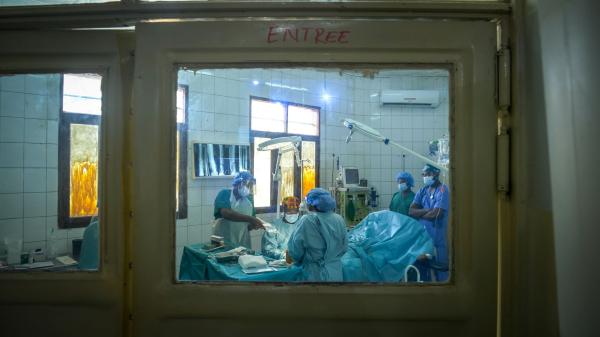These clashes involve the armed forces of the DRC and their allies on the one side, and the 23 March Movement on the other. On 7 February 2024, fighting resulted in 58 people who had been wounded by weapons – 31 of them civilians – arriving at Ndosho Hospital in Goma, which belongs to the Community of Baptist Churches in Central Africa (CBCA). The ICRC is supporting the hospital’s facility for treating wounded persons, but there are now twice as many patients as beds. Civilians and health facilities are increasingly exposed to the effects of the fighting.
Patients just kept on arriving on motorcycles and buses. These new arrivals plus the patients we were already treating before 7 February bring the total to 120, whereas we have a capacity of 64 beds. The lack of space to accommodate all these patients is our biggest challenge. We have already treated 219 people with weapon injuries since the beginning of 2024, explains Laurent Cresci, the ICRC’s head surgical nurse in Goma.
The influx of wounded people to Goma’s CBCA Ndosho Hospital is mainly due to the collapse of health facilities in or near the combat zones. Health facilities are unable to triage and stabilize the wounded, and generally handle patients in a dignified and effective manner, because of shortages of medical supplies and the lack of health personnel, many of whom have fled to safer areas. Some medical facilities are right in the centre of the fighting, swamped by civilians fleeing the clashes, as in the case of Mweso Hospital in Masisi.
Continuous fighting is making the delivery of aid increasingly difficult or even impossible, especially in the case of medical supplies, in the isolated areas of Rutshuru and Masisi. Secure humanitarian access is essential if we are to respond to the growing needs of people affected by the conflict. They are increasingly helpless and abandoned, often with no access to medical care.
Anne-Sylvie Linder, head of the ICRC’s North Kivu sub-delegation.
The ICRC reminds all concerned that under international humanitarian law, civilians must be protected and respected, and that during the conduct of hostilities, all practical precautions must be taken to minimize loss of civilian life and damage to civilian property. Medical facilities, ambulances and health personnel must also be protected and respected.
About the ICRC
The International Committee of the Red Cross (ICRC) is a neutral, impartial and independent organization with an exclusively humanitarian mandate that stems from the Geneva Conventions of 1949. It helps people around the world affected by armed conflict and other violence, doing everything it can to protect their lives and dignity and to relieve their suffering, often alongside its Red Cross and Red Crescent partners.
The ICRC has been operating in the DRC’s North Kivu Province since 1993, protecting assisting the victims of armed conflict and other violence.
For more information, please contact:
Nagham AWADA, ICRC Goma, +243 812256360, nawada@icrc.org
Eleonore ASOMANI, ICRC Geneva, +41 22 730 3443, press@icrc.org
We acknowledge Source link for the information.




